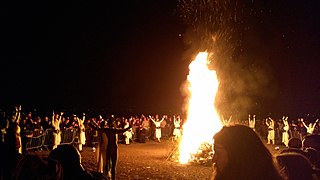
Bealtaine is the Gaelic May Day festival. It is held on 1 May, or about halfway between the spring equinox and summer solstice in the northern hemisphere. This marks the start of summer in Ireland, 1 May, as Ireland has a solar-based season system. The name of the festival is synonymous with the calendar month in Ireland. The month of May is called Mí na Bealtaine in the Irish language. Historically, it was widely observed throughout Ireland, Scotland, and the Isle of Man. In Irish the name for the festival day is Lá Bealtaine or May Day, in Scottish Gaelic Latha Bealltainn and in Manx Gaelic Laa Boaltinn/Boaldyn. It is one of the four Gaelic seasonal festivals—along with Samhain, Imbolc and Lughnasadh—and is similar to the Welsh Calan Mai.

Seamus Justin Heaney was an Irish poet, playwright and translator. He received the 1995 Nobel Prize in Literature. Among his best-known works is Death of a Naturalist (1966), his first major published volume. Heaney was and is still recognised as one of the principal contributors to poetry in Ireland during his lifetime. American poet Robert Lowell described him as "the most important Irish poet since Yeats", and many others, including the academic John Sutherland, have said that he was "the greatest poet of our age". Robert Pinsky has stated that "with his wonderful gift of eye and ear Heaney has the gift of the story-teller." Upon his death in 2013, The Independent described him as "probably the best-known poet in the world".
Ciaran Gerard Carson was a Northern Ireland-born poet and novelist.

Death of a Naturalist (1966) is a collection of poems written by Seamus Heaney, who received the 1995 Nobel Prize in Literature. The collection was Heaney's first major published volume, and includes ideas that he had presented at meetings of The Belfast Group. Death of a Naturalist won the Cholmondeley Award, the Gregory Award, the Somerset Maugham Award, and the Geoffrey Faber Memorial Prize.
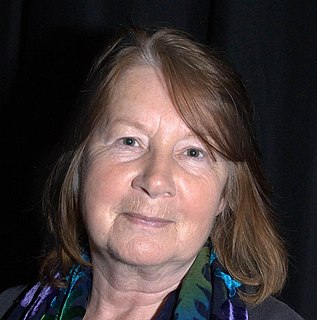
Medbh McGuckian is a poet from Northern Ireland.
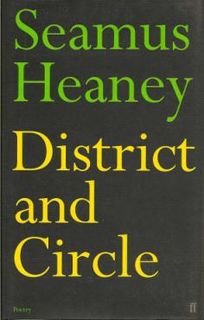
District and Circle is a poetry collection by Seamus Heaney, who received the 1995 Nobel Prize in Literature. It was published in 2006 and won the 2006 T. S. Eliot Prize, the most prestigious poetry award in the UK. The collection also won the Irish Times "Poetry Now Award".

"Pangur Bán" is an Old Irish poem, written in about the 9th century at or near Reichenau Abbey, in what is now Germany, by an Irish monk about his cat. Pangur Bán, 'White Pangur', is the cat's name, Pangur possibly meaning 'a fuller'. Although the poem is anonymous, it bears similarities to the poetry of Sedulius Scottus, prompting speculation that he is the author. In eight verses of four lines each, the author compares the cat's happy hunting with his own scholarly pursuits.

Bernard O'Donoghue FRSL is a contemporary Irish poet and academic.
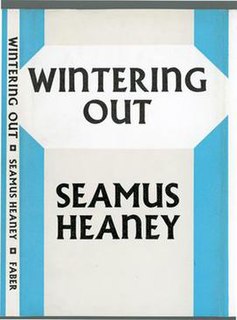
Wintering Out (1972) is a poetry collection by Seamus Heaney, who received the 1995 Nobel Prize in Literature.
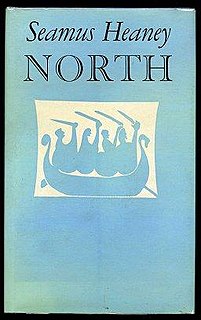
North (1975) is a collection of poems written by Seamus Heaney, who received the 1995 Nobel Prize in Literature. It was the first of his works that directly dealt with the Troubles in Northern Ireland, and it looks frequently to the past for images and symbols relevant to the violence and political unrest of that time. Heaney has been recorded reading this collection on the Seamus Heaney Collected Poems album.

Station Island is the sixth collection of original poetry written by the Northern Irish poet Seamus Heaney, who was awarded the Nobel Prize in Literature in 1995. It is dedicated to the Northern Irish playwright Brian Friel. The collection was first published in the UK and Ireland in 1984 by Faber & Faber and was then published in America by Farrar, Straus and Giroux in 1985. Seamus Heaney has been recorded reading this collection on the Seamus Heaney Collected Poems album.
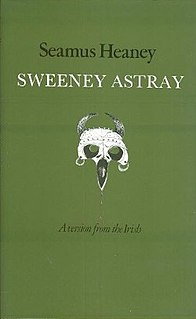
Sweeney Astray: A Version from the Irish is a version of the Irish poem Buile Shuibhne written by Seamus Heaney, based on an earlier translation by J.G. O'Keeffe. The work was first published in 1983 and won the 1985 PEN Translation Prize for verse, the first year the prize was awarded as such. Photographer Rachel Giese later took revised portions of the poem to accompany a collection of her photos titled Sweeney's Flight.

Field Work (1979) is the fifth poetry collection by Seamus Heaney, who received the 1995 Nobel Prize in Literature.
Events during the year 2004 in Northern Ireland.

Stations is a poetry collection by Seamus Heaney, who received the 1995 Nobel Prize in Literature. It was published in 1975.

Paula Meehan is an Irish poet and playwright.
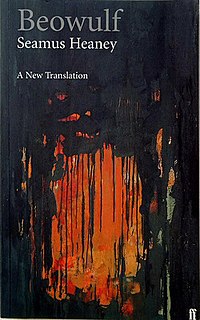
Beowulf: A New Verse Translation is a verse translation of the Old English epic poem Beowulf into modern English by the Irish poet and playwright Seamus Heaney. It was published in 1999 by Farrar, Straus, and Giroux and Faber and Faber, and won that year's Whitbread Book of the Year Award.

The air ship of Clonmacnoise is the subject of a historical anecdote related in numerous medieval sources. Though the original report, in the Irish annals, simply mentioned an apparition of ships with their crews in the sky over Ireland in the 740s, later accounts through the Middle Ages progressively expanded on this with picturesque details. First the ships were reduced to one ship over Teltown from which a crewman threw and then recovered a fishing-spear. Then the scene shifted to the abbey of Clonmacnoise, and later to Britain, and the fishing-spear was changed to an anchor which snagged on some feature of a church. The sailor who climbed down to release it was also said to be in danger of drowning in the thicker air of this lower world. The story was retold by Seamus Heaney in a well-known poem collected in his 1991 volume, Seeing Things.

The 1995 Nobel Prize in Literature was awarded to the Irish poet Seamus Heaney (1939–2013) "for works of lyrical beauty and ethical depth, which exalt everyday miracles and the living past." He is the fourth Irish Nobel laureate after the playwright Samuel Beckett in 1969.